The story of Greek government debt is a well-worn path. Greek public debt has ballooned to unprecedented levels in the last few years.
The 2012 default is just about evident and by the end of 2013 the debt ratio had already returned to the 2011 level. But is the stock of debt such a massive burden that a write-down is what is needed to help kick-start the Greek economy?
If we look at interest expenditure as a percentage of GDP we see that it has not been lower in the past quarter of a century.
From 1988 to 2013, public interest expenditure as a percentage of GDP averaged 6.9 per cent; in 2013 it was 4.0 per cent.
And this excludes two measures that have been introduced as part of the Troika programmes:
- Any interest paid on Greek government bonds to the ECB or the different NCBs is recycled back to Greece (c.0.8% of GDP in 2013)
- The Greek government does not have to pay the interest on its €142 billion loan facility from the EFSF. The interest is rolled up into the capital amount (c. 2.0% of GDP in 2013)
A similar pattern emerges if we look at interest expenditure as a percentage of government revenue.
Since 1998, public interest expenditure has been equivalent to 19 per cent, on average, of government revenue; in 2013 it was 9 per cent.
So there is a bit of a contradiction – although the stock of Greek debt has never been higher, debt servicing costs have never been lower (at least since 1988). This is because the average interest rate on Greek government debt is lower than at any time since 1988.
In the past quarter of a century the implied interest rate on Greek government debt has averaged 7 per cent, in 2013 it was 2.25 per cent.
Greece has had much higher debt servicing costs in the past and the way out of these was through high inflation. When debt servicing costs were heading over 10 per cent of GDP in the late 1980s, inflation was 15 per cent and sometimes more.
If we use these interest and inflation rates we can see that in the late 1980s and early 1990s the real interest was negative. It is positive now but not unusually so.
One refrain heard is that the primary surpluses (the government balance before interest expenditure) required to bring Greece’s government debt ratio down are not feasible, at least politically. History would suggest that this is not the case.
During the 1990s Greece made efforts to achieve the Maastricht criteria for entry into EMU. This meant a reduced reliance on inflation to stabilise the debt ratio. But the Greek debt ratio was stable during the 1990s. It might have been close to 100 per cent of GDP but it wasn’t increasing. This wasn’t because the inflation rate exceeded the interest rate (from 1994 to 1999 the real interest rate averaged 3.6 per cent). The reason the debt ratio didn’t increase was because sufficiently large primary surpluses were run.
From 1994 to 1999 primary surplus averaging 3.4 per cent of GDP were achieved by Greece. This story of what happened then is now well known. Greece used Goldman Sachs to manipulate its government accounts which facilitated the erosion of the primary surpluses achieved during the 1990s without triggering (too many) alarm bells under the Stability and Growth Pact.
However, the point is simply that Greece moved to stabilise the debt ratio in the 1990s when debt servicing costs were far higher than they are now. This was achieved using large enough primary surpluses – and maintained, at least a while. Correlation is not causation but here is the real growth rate overlaid on the primary balances.
The 3 per cent of GDP primary balances of the 1990s were accompanied with real GDP growth rates of the same magnitudes. As we know this did not continue in the 2000s and by 2003 a primary deficit had returned and these averaged around 2 per cent GDP up to 2008 (the overall deficit average nearly 7 per cent of GDP). Imbalances built up and when measures were introduced to try and correct the deficit the Greek economy went into a nosedive.
Will a debt write down solve Greece’s problems? No. Debt servicing costs have never been lower. If debt write down led to economic growth Greek should be first in class as it has a €107 billion debt write down (PSI) in 2012. The focus needs to be on the flows; not the stocks. And on this Syriza are correct.
What use is a proposal to reduce Greek debt to 50 per cent of GDP if Greece has to pay 5 per cent interest on the remaining debt. That would give an interest bill greater than it pays now. The debt ratio of 175 per cent of GDP is not the source of Greece’s problems (and with differing interest rates and maturities comparing countries with the debt ratio is little more than a blunt interest).
Yes, Greece does need a further reduction in its net debt interest costs. There is still some scope for this. And a reduction in the target for the primary surplus. 1.5 per cent of GDP is probably too low but 2.5 per cent might work. The wonks can get out their calculators, spreadsheets and acronyms to engineer a further reduction in the net interest cost of the Greece’s debt but there is no outside help that can bring about the primary surplus. And this is where Syriza face their greatest challenges.
Reaching an agreement on Greek debt is achievable. This will cost the creditor countries but has to be done. Ireland can reduce the interest rate on the €347 million loan provided to Greece in 2010. The fact that it needs calculators and spreadsheets means it is difficult to communicate. This is good in the creditor countries where some people don’t want to pay for Greek profligacy, but bad in Greece because explaining the benefits is a hard sell.
The most important thing, aside from lower interest rates, is to actually provide the money on lengthy terms. The removal of debt rollover fears will provide some much needed certainty. Whatever about a cold analysis of interest rates it is the animal spirits of individual decision-making that matters. The Greek people need to be assured that they are contributing to an economy that will be in place for the long term. I’d imagine there has been a lot taken out of the economy over the past few years; that needs to be reversed.
The 175 per cent of GDP debt gives a focal point for all the attention on Greece, but in a sense it is misdirected. The focus needs to be on the flows. The EU can help with one (interest) and possibly the ECB with another factor (a bit of inflation) but it is the the rest that must be fixed (taxes, spending, consumption, investment, exports……).
Tweet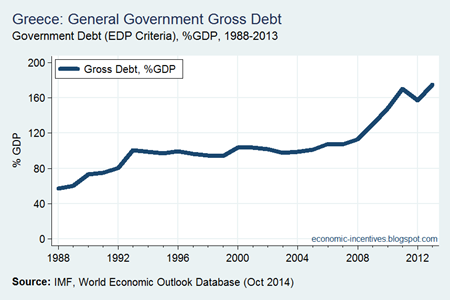
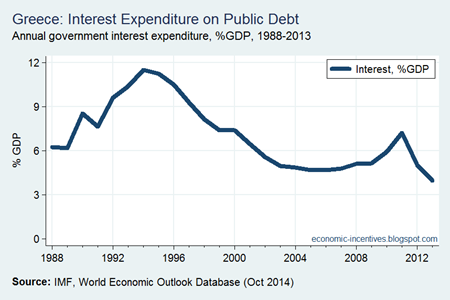
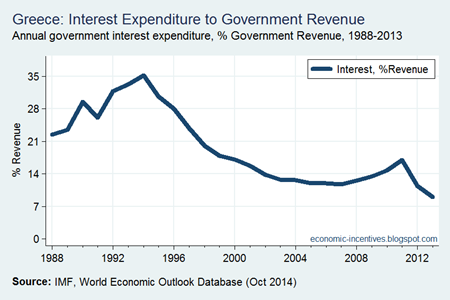
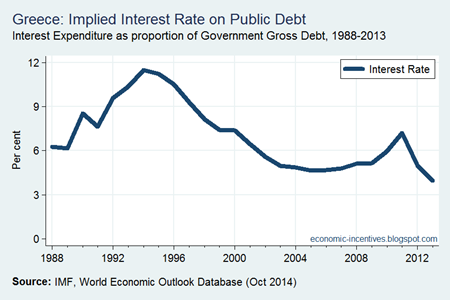
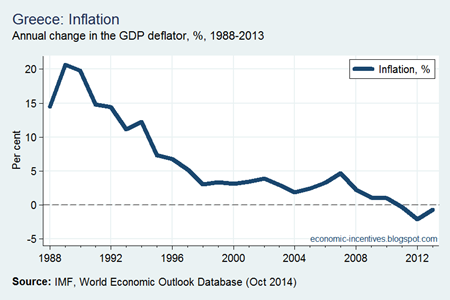
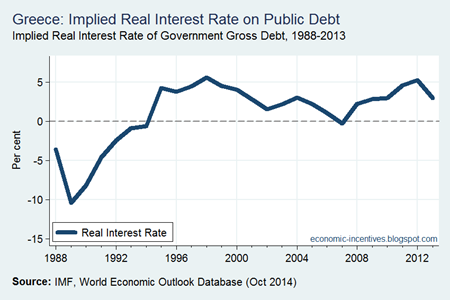
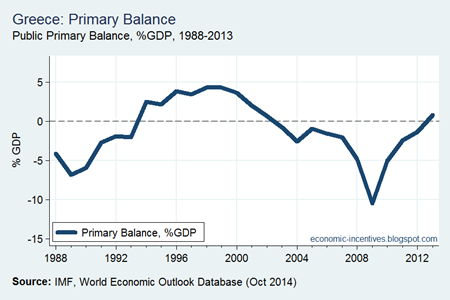




No comments:
Post a Comment